新概念英语第一册课文翻译及学习笔记
新概念英语第一册课文翻译及学习笔记Lesson99

新概念英语第一册课文翻译及学习笔记Lesson99【课文】ANDY: Ow!LUCY: What's the matter, Andy?ANDY: I slipped and fell downstairs.LUCY: Have you hurt yourself?ANDY: Yes, I have. I think that I've hurt my back.LUCY: Try and stand up. Can you stand up? Here. Let me help you.ANDY: I'm sorry, Lucy. I'm afraid that I can't get up.LUCY: I think that the doctor had better see you. I'll phone Dr. Carter.LUCY: The doctor says that he will come at once. I'm sure that you need an X-ray, Andy.【课文翻译】安迪:啊哟!露西:怎么了,安迪?安迪:我滑了一跤,从楼梯上摔下来了。
露西:你摔伤了没有?安迪:是啊,摔伤了。
我想我把背摔坏了。
露西:试试站起来。
你能站起来吗?来,让我帮你。
安迪:对不起,露西,恐怕我站不起来。
露西:我想请医生来给你看一下。
我去给卡特医生打电话。
露西:医生说他马上就来。
安迪,我看你需要做一次X光透视。
【生词】ow int. 哎哟slip v. 滑倒,滑了一脚fall (fell, fallen) v. 落下,跌倒downstairs adv. 下楼hurt (hurt, hurt) v. 伤,伤害,疼痛back n. 背stand up 起立,站起来help v. 协助at once 立即sure adj. 一定的,确信的X-ray n. X光透视【知识点讲解】1. 今天我们要接触到宾语从句的基本形式,请大家看课文中出现的这些句子:I think that I've hurt my back.(我想+我伤了我的背。
新概念英语第一册课文翻译及学习笔记Lesson109
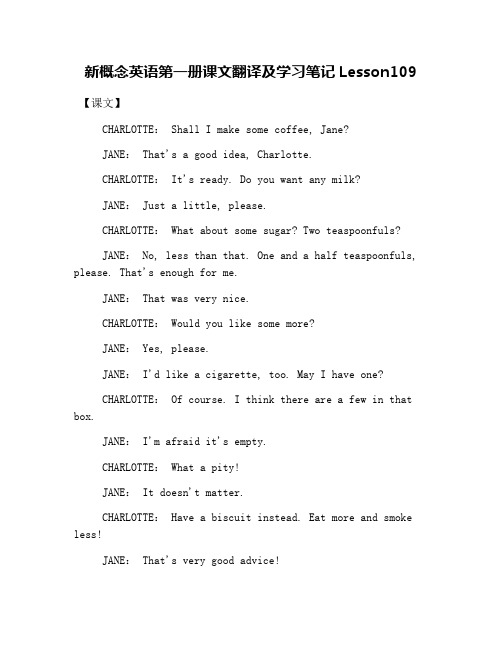
新概念英语第一册课文翻译及学习笔记Lesson109【课文】CHARLOTTE: Shall I make some coffee, Jane?JANE: That's a good idea, Charlotte.CHARLOTTE: It's ready. Do you want any milk?JANE: Just a little, please.CHARLOTTE: What about some sugar? Two teaspoonfuls?JANE: No, less than that. One and a half teaspoonfuls, please. That's enough for me.JANE: That was very nice.CHARLOTTE: Would you like some more?JANE: Yes, please.JANE: I'd like a cigarette, too. May I have one?CHARLOTTE: Of course. I think there are a few in that box.JANE: I'm afraid it's empty.CHARLOTTE: What a pity!JANE: It doesn't matter.CHARLOTTE: Have a biscuit instead. Eat more and smoke less!JANE: That's very good advice!【课文翻译】夏洛特:我来煮点咖啡好吗,简?简:这是个好主意,夏洛特。
夏洛特:咖啡好了,你要放点奶吗?简:请稍加一点。
夏洛特:加些糖怎么样?两茶匙行吗?简:不,再少一些。
请放一勺儿半。
那对我已充足了。
简:太好了。
夏洛特:你再来点吗?简:好的,请再来一点。
(完整版)新概念英语第一册课文翻译及学习笔记Lesson135

新概念英语第一册课文翻译及学习笔记Lesson135【课文】REPORTER: Are you really going to retire, Miss Marsh?MISS MARSH: I may. I can't make up my mind. I will have to ask my future husband. He won't let me make another film.REPORTER: Your future husband, Miss Marsh?MISS MARSH: Yes. Let me introduce him to you. His nameis Carlos. We are going to get married next week.KATE: Look, Liz! Here's another report about Karen Marsh. Listen: 'Karen Marsh: The latest. At her LondonHotel today Miss Marsh told reporters she might retire. She said she couldn't make up her mind. She said she would haveto ask her future husband. She said her future husband would not let her make another film. Then she introduced us toCarlos and told us they would get married next week.'LIZ: That's sensational news, isn't it, Kate?KATE: It certainly is. He'll be her sixth husband!【课文翻译】记者:马什小姐,您真的准备退休吗,?马什小姐:有可能退。
新概念英语第一册课文翻译及学习笔记Lesson21_26
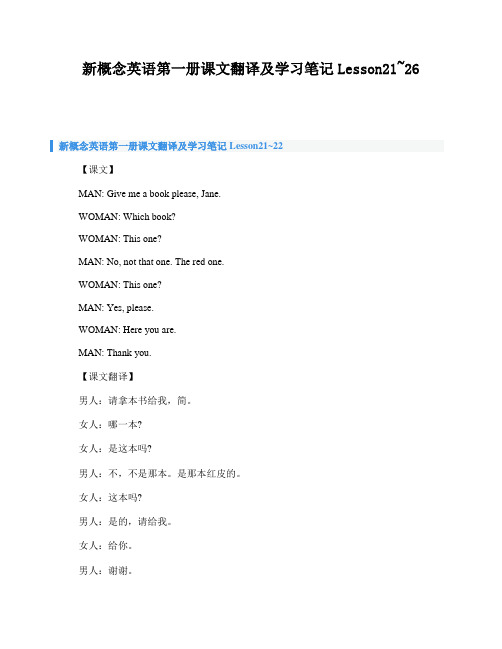
新概念英语第一册课文翻译及学习笔记Lesson21~26新概念英语第一册课文翻译及学习笔记Lesson21~22【课文】MAN: Give me a book please, Jane.WOMAN: Which book?WOMAN: This one?MAN: No, not that one. The red one.WOMAN: This one?MAN: Yes, please.WOMAN: Here you are.MAN: Thank you.【课文翻译】男人:请拿本书给我,简。
女人:哪一本?女人:是这本吗?男人:不,不是那本。
是那本红皮的。
女人:这本吗?男人:是的,请给我。
女人:给你。
男人:谢谢。
【生词】give v. 给one pron.一个which question word 哪一个【知识点讲解】1. 今天我们来学习一种新的句型:祈使句,Imperative Sentence 。
用于表达命令、请求、劝告、警告、禁止等的句子叫做祈使句。
祈使句的主语一般都省略,直接用动词原形开头。
比如课文中的:Give me a book please. 这里如果用完整的表达是You give a book please. 但除非是要强调You,一般很少这么表达。
再举几个例子:Be quiet, please. 或 Please be quiet. ——请安静。
在祈使句中please放在句首句尾都是可以的。
这里可以看到用到的是be动词原形。
Sit down, please. ——请坐下。
Look out! 或 Watch out! ——小心!2. which这个疑问词我们之前提到过,表示对确切物体的询问。
which和what的区别是:前者用于选择范围较小或较明确的场合,后者用于选择范围较大或不明确的场合。
比如:Which color is your car, black or white? 你的车是什么颜色?黑色或白色?(确切地在黑与白中间提问)What color is your car? 你的车是什么颜色的?(不确定是什么颜色,没有限制)另外课文当中的which one是which book的省略。
新概念英语第一册课文翻译及学习笔记Lesson111

新概念英语第一册课文翻译及学习笔记Lesson111【课文】MR.FRITH:I like this television very much. How much does it cost?ASSISTANT:It's the most expensive model in the shop. It costs five hundred pounds.MRS. FRITH:That's too expensive for us. We can't afford all that money.ASSISTANT:This model's less expensive than that one.It's only three hundred pounds. But, of course, it's not as good as the expensive one.MR. FRITH: I don't like this model. The other model's more expensive, but it's worth the money.MR. FRITH: Can we buy it on instalments?ASSISTANT:Of course. You can pay a deposit of thirty pounds, and then fourteen pounds a month for three years.MR. FRITH:Do you like it, dear?MRS. FRITH:I certainly do, but I don't like the price. You always want the best, but we can't afford it. Sometimes you think you're a millionaire!MR.FRITH:Millionaires don't buy things on instalments!【课文翻译】弗里斯先生:我非常喜欢这台电视机。
新概念英语第一册课文翻译及学习笔记Lesson23

新概念英语第一册课文翻译及学习笔记Lesson23【课文】MAN: Give me some glasses please, Jane.WOMAN: Which glasses?WOMAN: These glasses?MAN: No, not those.The ones on the shelf.WOMAN: These?MAN: Yes, please.WOMAN: Here you are.MAN: Thanks.【课文翻译】丈夫:请拿给我几只玻璃杯,简。
妻子:哪几只?妻子:是这几只吗?丈夫:不,不是那几只。
是架子上的那几只。
妻子:这几只?丈夫:是的,请拿给我。
妻子:给你。
丈夫:谢谢。
【生词】on prep. 在……之上shelf n. 架子,搁板【知识点讲解】1. 今天来学习一个新的概念:直接宾语和间接宾语。
在课文中的"Give me some glasses"一句中有两个宾语:其中"some glasses"是直接宾语;"me"是间接宾语。
直接宾语是及物动词(give)的直接对象,也就是说这里give这个“给”的动作,给的是杯子,所以杯子就是直接宾语;而间接宾语是及物动词的动作所涉及的人或事务,也能够说间接宾语表示动作是对谁做的,或者是为谁做的。
在本句中give这个动作是对me,我做的,所以me是间接宾语。
直接宾语和间接宾语不但仅能够用在祈使句中,在陈述句里也能够使用。
比如:He gives me a book. 他给我一本书。
其实这里的语法和我们中文是一样的。
大家应该比较容易理解。
还需要注意的是,当间接宾语是人称代词时,人称代词要用宾格。
比如me(I的宾格)、you(you的宾格)、her(she的宾格)等等。
2. which这个疑问词,上一节课我们用到的例子中它代指的是单数"Which book?",其实它也能够代指复数,比如本课中的"Which glasses?"3. 当用one代指复数时要变成ones,比如文中的"The ones on the shelf." 另外提个小问题:shelf这个单词的动词变化,按照规则应该变成什么呢?。
新概念英语第一册课文翻译及学习笔记Lesson27

新概念英语第一册课文翻译及学习笔记Lesson27【课文】Mrs. Smith's living room is large.There is a television in the room.The television is near the window.There are some magazines on the television.There is a table in the room.There are some newspapers on the table.There are some armchairs in the room.The armchairs are near the table.There is a stereo in the room.The stereo is near the door.There are some books on the stereo.There are some pictures in the room.The pictures are on the wall.【课文翻译】史密斯夫人的客厅很大。
客厅里有台电视机。
电视机靠近窗子。
电视机上放着几本杂志。
客厅里有张桌子。
桌上放着几份报纸。
客厅里有几把扶手椅。
这些扶手椅靠近桌子。
客厅里有台立体声音响。
音响靠近门。
音响上面有几本书。
客厅里有几幅画。
画挂在墙上。
【生词】living room 客厅near prep.靠近window n. 窗户armchair n. 扶手椅door n. 门picture n. 图画wall n. 墙【知识点讲解】1. 今天我们要继续学习和方位相关的表达方式。
文中提到:near sth. 靠近某物;on the wall,在墙上。
注意这里的介词用的是on,如果是in the wall的话,那么意思就是“镶在墙里面”。
on和in这两个介词的意思,前者是在……之上,后者是在……里面,一般没有什么异议。
新概念英语第一册Lesson123~128课文翻译及学习笔记

【导语】学习新概念英语并不难啊。
你还在为英语成绩低拖后腿⽽烦恼吗?不要着急,⼩编为⼤家提供了“新概念英语第⼀册Lesson123~128课⽂翻译及学习笔记”。
相信加⼊学习当中的你,很快便不再受英语的困扰!还在等什么?和⼩编⼀起来学习吧!新概念英语第⼀册Lesson123~124课⽂翻译及学习笔记 【课⽂】 MIKE: Look, Scott. This is a photograph I took during my trip to Australia. SCOTT: Let me see it, Mike. SCOTT: This is a good photograph. Who are these people? MIKE: They're people I met during the trip. MIKE: That's the ship we travelled on. SCOTT: What a beautiful ship! SCOTT: Who's this? MIKE: That's the man I told you about.Remember? SCOTT: Ah yes. The one who offered you a job in Australia. MIKE: That's right. SCOTT: Who's this? MIKE: Guess! SCOTT: It's not you, is it? MIKE: That's right. MIKE: I grew a beard during the trip, but I shaved it off when I came home. SCOTT: Why did you shave it off? MIKE: My wife didn't like it! 【课⽂翻译】 迈克:看,这是我到澳⼤利来旅⾏时拍的⼀张照⽚。
新概念英语第一册Lesson93~98课文翻译及学习笔记
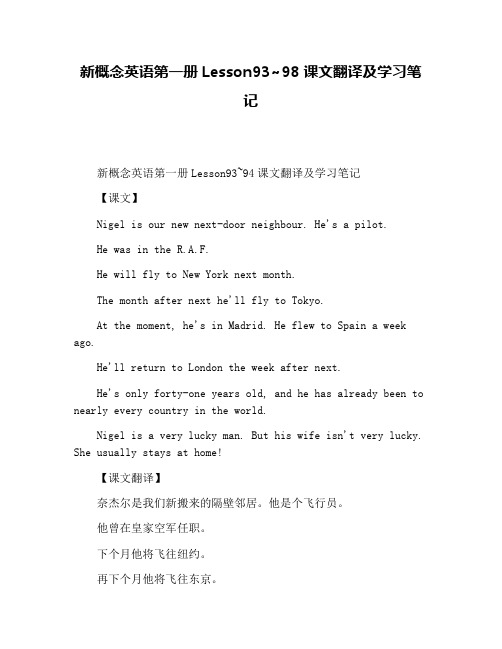
新概念英语第一册Lesson93~98课文翻译及学习笔记新概念英语第一册Lesson93~94课文翻译及学习笔记【课文】Nigel is our new next-door neighbour. He's a pilot.He was in the R.A.F.He will fly to New York next month.The month after next he'll fly to Tokyo.At the moment, he's in Madrid. He flew to Spain a week ago.He'll return to London the week after next.He's only forty-one years old, and he has already been to nearly every country in the world.Nigel is a very lucky man. But his wife isn't very lucky. She usually stays at home!【课文翻译】奈杰尔是我们新搬来的隔壁邻居。
他是个飞行员。
他曾在皇家空军任职。
下个月他将飞往纽约。
再下个月他将飞往东京。
现在他在马德里。
他是一星期以前飞到西班牙的。
再下个星期他将返回伦敦。
他只有41岁,但他却去过世界上几乎每一个国家。
奈杰尔是个很幸运的人。
但他的妻子运气不很好。
她总是呆在家里!【生词】pilot n. 飞行员return v. 返回New York n. 纽约Tokyo n. 东京Madrid n. 马德里fly (flew, flown) v. 飞行【知识点讲解】1. next-door neighbour 意思是隔壁邻居。
2. R.A.F 是 the Royal Air Force 英国皇家空军的简写;3. next month, 下个月;the month after next,下下个月;the week after next,下下周。
新概念英语第一册课文翻译及学习笔记Lesson15
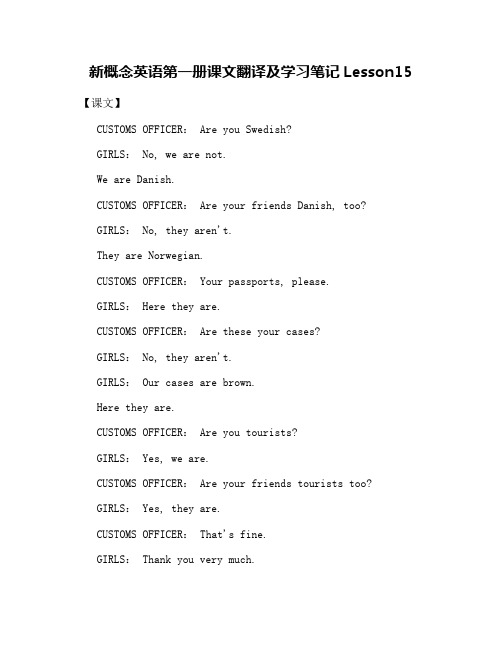
新概念英语第一册课文翻译及学习笔记Lesson15【课文】CUSTOMS OFFICER: Are you Swedish?GIRLS: No, we are not.We are Danish.CUSTOMS OFFICER: Are your friends Danish, too?GIRLS: No, they aren't.They are Norwegian.CUSTOMS OFFICER: Your passports, please.GIRLS: Here they are.CUSTOMS OFFICER: Are these your cases?GIRLS: No, they aren't.GIRLS: Our cases are brown.Here they are.CUSTOMS OFFICER: Are you tourists?GIRLS: Yes, we are.CUSTOMS OFFICER: Are your friends tourists too?GIRLS: Yes, they are.CUSTOMS OFFICER: That's fine.GIRLS: Thank you very much.【课文翻译】海关官员:你们是瑞典人吗?姑娘们:不,我们不是瑞典人。
我们是丹麦人。
海关官员:你们的朋友也是丹麦人吗?姑娘们:不,他们不是丹麦人。
他们是挪威人。
海关官员:请出示你们的护照。
姑娘们:给您。
海关官员:这些是你们的箱子吗?姑娘们:不,不是。
姑娘们:我们的箱子是棕色的。
在这儿呢。
海关官员:你们是来旅游的吗?姑娘们:是的,我们是来旅游的。
海关官员:你们的朋友也是来旅游的吗?姑娘们:是的,他们也是。
海关官员:好了。
姑娘们:非常感谢。
【生词】customs n. 海关officer n. 官员girl n. 女孩,姑娘Danish adj.& n. 丹麦的、丹麦人。
新概念英语第一册课文翻译及学习笔记Lesson95
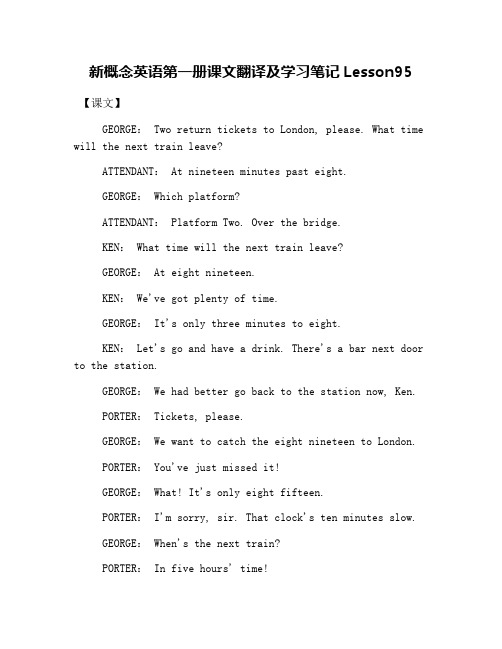
新概念英语第一册课文翻译及学习笔记Lesson95【课文】GEORGE: Two return tickets to London, please. What time will the next train leave?ATTENDANT: At nineteen minutes past eight.GEORGE: Which platform?ATTENDANT: Platform Two. Over the bridge.KEN: What time will the next train leave?GEORGE: At eight nineteen.KEN: We've got plenty of time.GEORGE: It's only three minutes to eight.KEN: Let's go and have a drink. There's a bar next door to the station.GEORGE: We had better go back to the station now, Ken.PORTER: Tickets, please.GEORGE: We want to catch the eight nineteen to London.PORTER: You've just missed it!GEORGE: What! It's only eight fifteen.PORTER: I'm sorry, sir. That clock's ten minutes slow.GEORGE: When's the next train?PORTER: In five hours' time!【课文翻译】乔治:买两张到伦敦的往返票。
下一班火车什么时候开?服务员:8点19分。
新概念英语第一册Lesson93~98课文翻译及学习笔记

新概念英语第一册Lesson93~98课文翻译及学习笔记新概念英语第一册Lesson93~94课文翻译及学习笔记【课文】Nigel is our new next-door neighbour. He’s a pilot.He was in the R.A.F.He will fly to New York next month.The month after next he’ll fly to Tokyo.At the moment, he’s in Madrid. He flew to Spain a week ago.He’ll return to London the week after next.He’s only forty-one years old, and he has already been to nearly every country in the world.Nigel is a very lucky man. But his wife isn’t very lucky. She usually stays at home!【课文翻译】奈杰尔是我们新搬来的隔壁邻居。
他是个飞行员。
他曾在皇家空军任职。
下个月他将飞往纽约。
再下个月他将飞往东京。
现在他在马德里。
他是一星期以前飞到西班牙的。
再下个星期他将返回伦敦。
他只有41岁,但他却去过世界上几乎每一个国家。
奈杰尔是个很幸运的人。
但他的妻子运气不很好。
她总是呆在家里!【生词】pilot n. 飞行员return v. 返回New York n. 纽约Tokyo n. 东京Madrid n. 马德里fly (flew, flown) v. 飞行【知识点讲解】1. next-door neighbour 意思是隔壁邻居。
2. R.A.F 是 the Royal Air Force 英国皇家空军的简写;3. next month, 下个月;the month after next,下下个月;the week after next,下下周。
(完整版)新概念英语第一册课文翻译及学习笔记Lesson31

新概念英语第一册课文翻译及学习笔记Lesson31【课文】JEAN: Where's Sally, Jack?JACK: She's in the garden, Jean.JEAN: What's she doing?JACK: She's sitting under the tree.JEAN: Is Tim in the garden, too?JACK: Yes, he is.He's climbing the tree.JEAN: I beg your pardon?Who's climbing the tree?JACK: Tim is.JEAN: What about the dog?JACK: The dog's in the garden, too.It's running across the grass.It's running after a cat.【课文翻译】琼:杰克,萨莉在哪儿?杰克:她在花园里,琼。
琼:她在干什么?杰克:她正在树荫下坐着。
琼:蒂姆也在花园里吗?杰克:是的,他也在花园里。
他正在爬树。
琼:你说什么?谁在爬树?杰克:蒂姆在爬树。
琼:那么狗呢?杰克:狗也在花园里。
它正在草地上跑,在追一只猫。
【生词】garden n. 花园under prep.在……这下tree n. 树climb v. 爬,攀登who pron.谁run v. 跑grass n. 草,草地after prep.在……之后across prep.横过,穿过cat n. 猫【知识点讲解】1. 今天要学习一个重要的语法点:现在实行时态。
在英语中,要表达正在发生的动作或事件,需要用这个时态。
这个时态的基本格式是:be动词现在时+动词的现在实行时态简单一点说就是"am/are/is + 动词ing形式"。
比如课文中的"She's sitting..." "He's climbing..." "It's running..."动词变成现在实行时态基本格式就是在后面直接加ing,比如climb-climbing, walk-walking, catch-catching...如果动词以e结尾,则去掉e加ing,比如give-giving, move-moving...如果动词只有一个元音字母,并在其后跟一个辅音字母,则将辅音字母双写、再加ing。
新概念英语第一册课文翻译与学习笔记Lesson139

新概念英语第一册课文翻译与学习笔记Lesson139【课文】GRAHAMTURN:ERIthatyou,JohnJOHNSMIT:HYe,peaking.GRAHAMTURN:ERTellMarywe'llbelatefordinnerthievening.JOHNSMIT:HI'mafraidIdon'tundertand.GRAHAMTURN:ERHan'tMarytoldyouSheinvited Charlotteandmetodinnerthievening.IaidIwouldbeat yourhoueati某o'clock,butthebowantmetodoomee某trawork.I'llhavetotayattheoffice.Idon'tknowwhenI'llfinih.Oh,andbytheway,mywifewanttoknow ifMaryneedanyhelp.JOHNSMIT:HIdon'tknowwhatyou'retalkingabout. GRAHAMTURN:ERThatiJohnSmith,in'titJOHNSMIT:HYe,I'mJohnSmith.GRAHAMTURN:ERYouareJohnSmith,theengineer,aren'tyouJOHNSMIT:HThat'right.GRAHAMTURN:ERYouworkfortheOvereaEngineeringJOHNSMIT:HNo,Idon't.I'mJohnSmiththetelephoneengineerandI'mrepairingyourtelephoneline.【课文翻译】格雷厄姆·特纳:是你吗,约翰约翰·史密斯:是我,请讲。
新概念英语第一册课文翻译及学习笔记Lesson127

新概念英语第一册课文翻译及学习笔记Lesson127【课文】KATE:Canyourecognizethatwoman,Liz?LIZ:IthinkIcan,Kate.ItmustbeKarenMarsh,the actress.KATE:Ithoughtso.Who'sthatbesideher?LIZ:ThatmustbeConradReeves.KATE:ConradReeves,theactor?It'scan'tbe.Letme haveanotherlook.Ithinkyou'reright!Isn'theherthird husband?LIZ:No.Hemustbeherfourthorfifth.KATE:Doesn'tKarenMarshlookold!LIZ:Shedoes,doesn'tshe!Ireadshe'stwenty-nine, butshemustbeatleastforty.KATE:I'msuresheis.LIZ:ShewasafamousactresswhenIwasstillat school.KATE:Thatwasalongtimeago,wasn'tit?LIZ:Notthatlongago!I'mnotmorethantwenty-nine myself.【课文翻译】凯特:莉兹,你能认出那个女人吗?莉兹:我想我认得出来,凯特。
那一定是女演员卡.马会。
凯特:我也这样想。
她旁边的那个人是谁?莉兹:一定是康拉德.里弗斯。
凯特:康拉德.里弗斯,那个男演员吗?不可能是。
让我再看一看。
我想你是对的。
他不是她的第3个丈夫吗?莉兹:不,他一定是她的第4个或第5个丈夫。
凯特:卡伦看上去不显老嘛!莉兹:是的,谁说不是呢!我从报上看到她是29岁,但她一定至少有40岁了。
凯特:我肯定她有40岁了。
新概念英语第一册课文翻译及学习笔记Lesson113
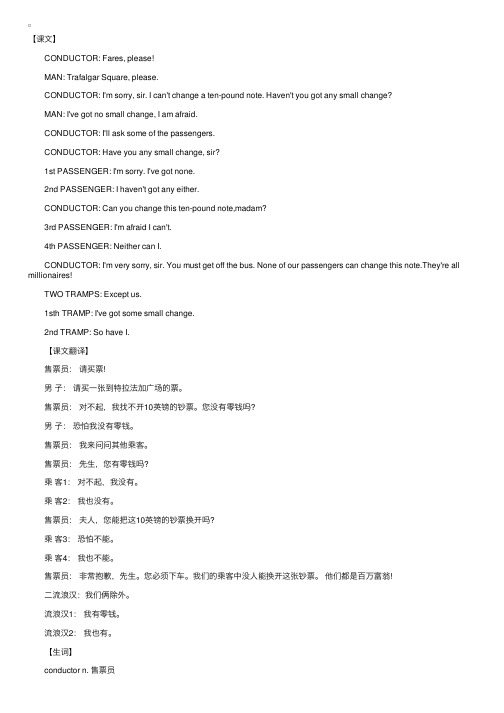
【课⽂】 CONDUCTOR: Fares, please! MAN: Trafalgar Square, please. CONDUCTOR: I'm sorry, sir. I can't change a ten-pound note. Haven't you got any small change? MAN: I've got no small change, I am afraid. CONDUCTOR: I'll ask some of the passengers. CONDUCTOR: Have you any small change, sir? 1st PASSENGER: I'm sorry. I've got none. 2nd PASSENGER: I haven't got any either. CONDUCTOR: Can you change this ten-pound note,madam? 3rd PASSENGER: I'm afraid I can't. 4th PASSENGER: Neither can I. CONDUCTOR: I'm very sorry, sir. You must get off the bus. None of our passengers can change this note.They're all millionaires! TWO TRAMPS: Except us. 1sth TRAMP: I've got some small change. 2nd TRAMP: So have I. 【课⽂翻译】 售票员:请买票! 男⼦:请买⼀张到特拉法加⼴场的票。
售票员:对不起,我找不开10英镑的钞票。
您没有零钱吗? 男⼦:恐怕我没有零钱。
新概念英语第一册课文翻译及学习笔记Lesson121

【课⽂】 Customer: I bought two expensive dictionaries here half an hour ago, but I forgot to take them with me. Manager: Who served you, sir? Customer: The lady who is standing behind the counter. Manager: Which books did you buy? Customer: The books which are on the counter. Manager: Did you serve this gentleman half an hour ago, Caroline? He says he's the man who bought these books. Caroline: I can't remember. The man whom I served was wearing a hat. Manager: Have you got a hat, sir? Customer: Yes, I have. Manager: Would you put it on, please? Customer: All right. Manager: Is this the man that you served, Caroline? Caroline: Yes. I recognize him now. 【课⽂翻译】 顾客:半⼩时以前我在这⾥买了两本很贵的辞典,但是我忘了拿⾛。
经理:是谁接待您的,先⽣? 顾客:站在柜台后⾯的那位⼥⼠。
经理:您买的是两本什么书? 顾客:就是柜台上的那两本。
经理:卡罗琳,半⼩时前你接待过这位先⽣吗?他说他就是买这两本书的⼈。
卡罗琳:我记不起来了。
我接待的那个⼈戴着⼀顶帽⼦。
新概念英语第一册课文翻译及学习笔记Lesson39

【课⽂】 SAM: What are you going to do with that vase, Penny? PENNY: I'm going to put it on this table, Sam. SAM: Don't do that. Give it to me. PENNY: What are you going to do with it? SAM: I'm going to put it here, in front of the window. PENNY: Be careful! Don't drop it! PENNY: Don't put it there, Sam. Put it here, on this shelf. SAM: There we are! It's a lovely vase. PENNY: Those flowers are lovely, too. 【课⽂翻译】 萨姆:你打算如何处理那花瓶? 彭妮:我打算把它放在这张桌⼦上,萨姆。
萨姆:不要放在那⼉,把它给我。
彭妮:你打算怎么办? 萨姆:我准备把它放在这⼉,放在窗前。
彭妮:⼩⼼点!别摔了! 彭妮:别放在那⼉,萨姆。
放在这⼉,这个架⼦上。
萨姆:放好了!这是只漂亮的花瓶。
彭妮:这些花也很漂亮啊。
【⽣词】 front n. 前⾯ in front of 在……之前 careful adj. ⼩⼼的,仔细的 vase n. 花瓶 drop v. 掉下 flower n. 花 【知识点讲解】 1. 在第21课⾥,我们讲过祈使句的使⽤⽅法。
但当时讲到的都是祈使句的肯定形式,今天我们来学习它的否定形式。
其实⾮常简单,就是在动词原形前加上don't。
⽐如: Sit down!--Don't sit down! Give me the cup please.--Don't give me the cup please. 2. do with sth. 表⽰对某事、某⼈处理、有⾏动。
- 1、下载文档前请自行甄别文档内容的完整性,平台不提供额外的编辑、内容补充、找答案等附加服务。
- 2、"仅部分预览"的文档,不可在线预览部分如存在完整性等问题,可反馈申请退款(可完整预览的文档不适用该条件!)。
- 3、如文档侵犯您的权益,请联系客服反馈,我们会尽快为您处理(人工客服工作时间:9:00-18:30)。
新概念英语第一册课文翻译及学习笔记Lesson111【课文】
:I like this television very much. How much does it cost?
ASSISTANT:It's the most expensive model in the shop. It costs five hundred pounds.
MRS. FRITH:That's too expensive for us. We can't afford all that money.
ASSISTANT:This model's less expensive than that one.
It's only three hundred pounds. But, of course, it's not as good as the expensive one.
MR. FRITH: I don't like this model. The other model's more expensive, but it's worth the money.
MR. FRITH: Can we buy it on instalments?
ASSISTANT:Of course. You can pay a deposit of thirty pounds, and then fourteen pounds a month for three years.
MR. FRITH:Do you like it, dear?
MRS. FRITH:I certainly do, but I don't like the price. You always want the best, but we can't afford it. Sometimes you think you're a millionaire!
:Millionaires don't buy things on instalments!
【课文翻译】
弗里斯先生:我非常喜欢这台电视机。
请问它多少钱?
店员:这是店里最贵的型号。
它的售价是500英镑。
弗里斯夫人:这对我们来说是太贵了。
我们花不起那么多钱。
店员:这种型号的比那种要便宜些。
它只要300英镑。
但是,它当然没有价钱高的那种好。
弗里斯先生:我不喜欢这种型号。
那一种型号价格是贵一些,但它值这么多钱。
弗里斯先生:我们能够用分期付款的方式购买吗?
店员:当然能够。
您能够先付30英镑定金,然后每月14镑,3年付清。
弗里斯先生:你喜欢吗,亲爱的?
弗里斯夫人:我当然喜欢,但是我不喜欢这个价钱。
你总是要买的,可我们买不起。
有时候你认为自己是个百万富翁!
弗里斯先生:百万富翁是不会分期付款买东西的!
【生词】
model n. 模型
afford v. 付得起(钱)
deposit n. 预付定金
instalment n. 分期付款
price n. 价格
millionaire n. 百万富翁
【知识点讲解】
一. 单词拓展:
1. model 课文中,是模型的意思。
如飞机模型(model aeroplane),轮船模型(model ship)。
那汽车模型应该怎么说呢?此外,model 除了模型的意思外,还能够表示模特。
如走T台的模特fashion model,平面模特 still model。
那车模又应该怎么说?
2 millionaire 百万富翁 millionaire是个合成词,有
million(百万)+aire 组成。
那亿万富翁怎么说呢?
现在我们复习一下计数单位,在英语里,每三位数为一个计数单位。
我们从小到大复习一遍,thousand (千),million(百万),billion(十亿),trillion (万亿)。
给大家一个英语表达数字的小技巧:表达数字前,拿起笔,从个位数向高位数字作记号,每三位数字为一个单位。
如 123,456,789,123 (one hundred twenty three billion,four hundred fifty-six million, seven hundred eighty-nine thousand,one hundred and twenty-three.) 给同学们一个数字:707,想想用英语应该怎么说呢?
3. A be as+adj+as B A跟B一样……
这是一个比较中的等价句型:A跟B一样……例句:她跟我一样重。
She is as heavy as me. 那我跟她一样重,应该怎么说?
如果想表达A不如B时,我们只需要在这个结构中的be动词后面加上not。
如她不如我重。
She is not as heavy as me.
那要是“我没有她重”。
又应该怎么说?
二【口语学习】购物英语
问价:How much does it cost ?(课文)
How much is it?
What's the price ?/Could you tell me its price?
报价:It costs+价格 / It is +价格
还价:It is too expensive/dear
The price is a bit high .
I'm afraid I cannot afford it. 恐怕买不起。
afford 买得起,付得起钱
Would you low it down? 能不能低一点?
打折:give sb 百分数 discount 打折如:打八折 give 20% discount 折扣额=1-百分数
如:打七折,怎样?What about 30% discount?
付款:1)现金付款 pay in cash 2) 刷卡 pay in credit
3)分期付款 buy sth on instalment 4)支付定金 pay/put down
a deposit。
